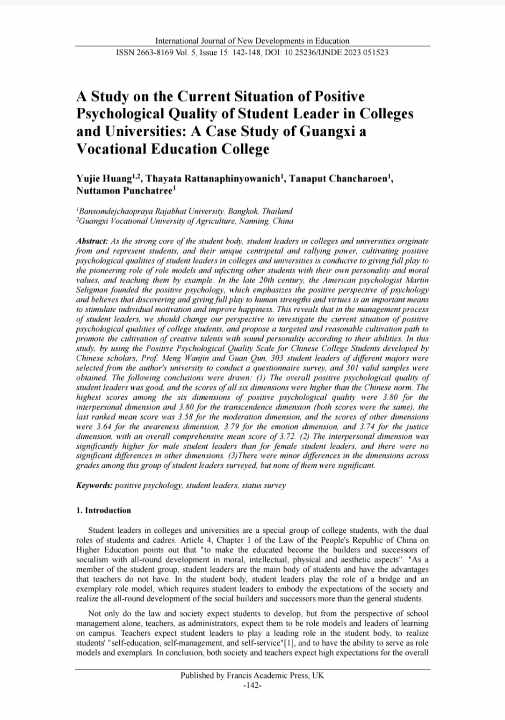Abstract: As the strong core of the student body, student leaders in colleges and universities originate
from and represent students, and their unique centripetal and rallying power, cultivating positive
psychological qualities of student leaders in colleges and universities is conducive to giving full play to
the pioneering role of role models and infecting other students with their own personality and moral
values, and teaching them by example. In the late 20th century, the American psychologist Martin
Seligman founded the positive psychology, which emphasizes the positive perspective of psychology
and believes that discovering and giving full play to human strengths and virtues is an important means
to stimulate individual motivation and improve happiness. This reveals that in the management process
of student leaders, we should change our perspective to investigate the current situation of positive
psychological qualities of college students, and propose a targeted and reasonable cultivation path to
promote the cultivation of creative talents with sound personality according to their abilities. In this
study, by using the Positive Psychological Quality Scale for Chinese College Students developed by
Chinese scholars, Prof. Meng Wanjin and Guan Qun, 303 student leaders of different majors were
selected from the author’s university to conduct a questionnaire survey, and 301 valid samples were
obtained. The following conclusions were drawn: (1) The overall positive psychological quality of
student leaders was good, and the scores of all six dimensions were higher than the Chinese norm. The
highest scores among the six dimensions of positive psychological quality were 3.80 for the
interpersonal dimension and 3.80 for the transcendence dimension (both scores were the same), the
last ranked mean score was 3.58 for the moderation dimension, and the scores of other dimensions
were 3.64 for the awareness dimension, 3.79 for the emotion dimension, and 3.74 for the justice
dimension, with an overall comprehensive mean score of 3.72. (2) The interpersonal dimension was
significantly higher for male student leaders than for female student leaders, and there were no
significant differences in other dimensions. (3)There were minor differences in the dimensions across
grades among this group of student leaders surveyed, but none of them were significant.
Keywords: positive psychology, student leaders, status survey
Huang, Y., Rattanaphinyowanich, T., Chancharoen, T., & Punchatree, N. (2023). A Study on the Current Situation of Positive Psychological Quality of Student Leaders in Colleges and Universities: A Case Study of Guangxi a Vocational Education College. International Journal of New Developments in Education, 5(15). 142-148 https://doi.org/10.25236/IJNDE.2023.051523
https://link.bsru.ac.th/vcihttps://link.bsru.ac.th/vcj

